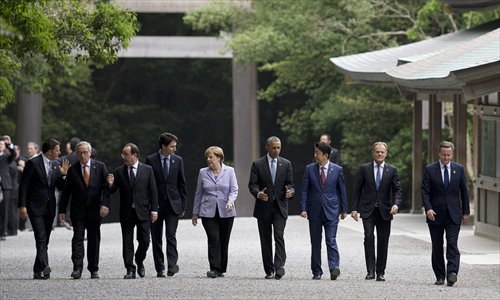Hiroshima visit triggers speculation
Obama trip aims to strengthen US-Japan allies, pivot to Asia: analyst

From left, Italian Premier Matteo Renzi, European Commission President Jean-Claude Juncker, French President Francois Hollande, Canadian Prime Minister Justin Trudeau, German Chancellor Angela Merkel, US President Barack Obama, Japanese Prime Minister Shinzo Abe, European Council President Donald Tusk and British Prime Minister David Cameron walk in a Shinto shrine in Ise in Japan on Thursday, as part of the G7 Summit. Photo: AP
US President Barack Obama is set to make a historic visit to Hiroshima on Friday as the first sitting US president to visit one of two sites of a nuclear attack.
Analysts said the visit aims to strengthen the US-Japan alliance by trying to sooth the historic wounds that have always been a thorny subject in US-Japan relations. Analysts are also concerned that the visit, which comes after the US lifting of the longstanding arms embargo on Vietnam, is part of its strategy to line up more Asian nations to contain China.
Despite being criticized by opponents for embarking on an "apology trip," the Obama administration previously said he will not revisit the decision to use the atomic bomb at the end of World War II.
"Our visit to Hiroshima will honor all those who were lost in World War II and reaffirm our shared vision of a world without nuclear weapons," Obama said at a joint press conference with Japanese Prime Minister Shinzo Abe.
The trip came as Obama and other leaders from the rich democracies are gathering for the G7 summit in Japan to discuss the sluggish global economy.
"Two things have obviously crossed Obama's mind when he made the decision to visit Hiroshima. One is to curb the stockpile of nuclear weapons, a key initiative of his policies. The other is to forge a stronger US-Japan alliance under the US pivot to Asia strategy, a legacy Obama would like to leave to his successor," Tao Wenzhao, a research fellow at the Institute of American Studies of the Chinese Academy of Social Sciences, told the Global Times.
Tao's views were echoed by Lian Degui, deputy director of the Center for Asia-Pacific Studies at the Shanghai Institutes for International Studies, who said although some Japanese are hoping for an apology, the US interpretation for the use of atomic bombs remains largely unchanged, which is that it was necessary at the time to prevent more bloodshed and end World War II.
"With China in mind, the US and Japan are planning closer cooperation. From Japan's perspective, it may want to seize the moment to demand a change of attitude from the US on World War II," Lian said.
Relations between China and the US have sunk to a low point as they spar over a series of issues, including those involving the South China Sea and cyber security.
Sino-Japanese relations have also deteriorated over the Diaoyu Islands and Japan's wartime aggression.
Chinese foreign ministry spokesperson Hong Lei said last week that "we hope by inviting foreign leaders to visit Hiroshima, Japan could show that it will never again tread on the path of militarism.
Agencies contributed to this story